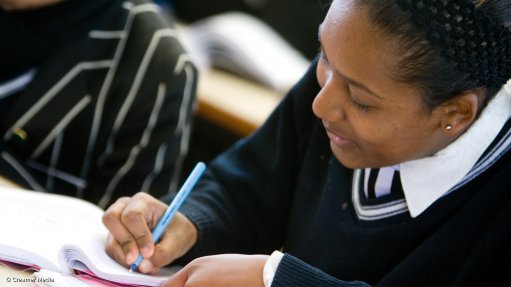
Photo by: Creamer Media
The World Health Organisation (WHO) on Monday, called on decision makers to reflect on a number of key factors when deciding on whether and how to reopen schools.
"First, a clear understanding about current Covid-19 transmission and severity of the virus in children is needed. Second, the epidemiology of Covid-19 where the school is geographically located needs to be considered.
"Third, the ability to maintain Covid-19 prevention and control measures within the school setting," WHO Director-General Dr Tedros Adhanom Ghebreyesus said.
"When reflecting on the decision to reopen schools, the local government should assess the capacity of the schools to maintain infection, prevention and control measures."
Efforts to pave a way to restart schools in South Africa stalled after school management teams, who were supposed to report at school on Monday, were directed not to come.
On Friday, teachers union, the South African Democratic Teachers Union says its members would not be going back to work on Monday because the department of basic education has failed to meet the minimum requirements to ensure safety measures have been put in place.
Basic education Minister Angie Motshekga announced on 30 April that school management teams should report for duty on 11 May, teachers on 18 May with the view that Grade 7 and Grade 12 learners would return to classes on 1 June.
Motshekga was expected to provide a detailed plan for schools to reopen on Thursday.
The WHO noted that more than four million cases of Covid-19 across the world have been registered.
"Over the past week several countries have started lifting stay at home orders and other restrictions in a phased way. Countries put these stringent measures in place, sometimes called lockdowns, in response to intense transmission.
"Many have used the time to ramp up their ability to test, trace, isolate and care for patients, which is the best way to track the virus, slow the spread and take pressure off the health systems," the world health body boss said.
"The good news is that there has been a great deal of success in slowing the virus and ultimately saving lives. However, such strong measures have come at a cost and we recognise the serious socio-economic impact of the lockdowns, which have had a detrimental effect on many people’s lives."
He said a slow, steady, lifting of lockdowns was key to both stimulating economies, while also keeping a vigilant eye on the virus so that control measures could be quickly implemented if an upswing in cases was identified.
"Over the weekend we saw signs of the challenges that may lie ahead. In the Republic of Korea, bars and clubs were shut as a confirmed case led to many contacts being traced. In Wuhan, China, the first cluster of cases since their lockdown was lifted was identified.
"Germany has also reported an increase in cases since an easing of restrictions. Fortunately, all three countries have systems in place to detect and respond to a resurgence in cases," he said.